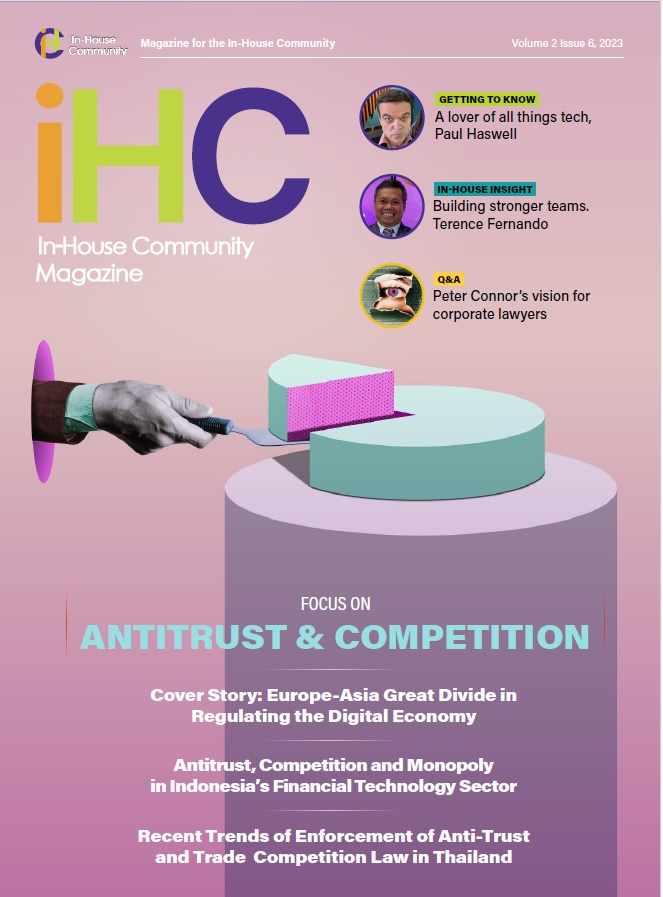
FRENY PATEL
The proliferation of the Internet and the critical role of technology players in our daily lives have regulators grappling with how best the digital economy should be regulated against the anti-competitive behaviour of large online platforms.
Europe has taken the lead towards ex-ante regulations with the Digital Markets Act (“DMA”), which came into effect a little over a month ago on 2 May 2023. The DMA sets the ground rules on what is acceptable behaviour. The DMA is aimed at reining in ‘Big Tech’ and their alleged abuse of power, but is still a work in progress.
Digital platforms, often identified as gatekeepers, have the tendency to adopt a winnertakes-all approach and monetize market data. The idea behind ex-ante regulations is to truncate the time period and intervene before the market is entrenched with one or two players.
However, a Singapore-based policy director with a leading multinational digital platform recently voiced concerns and cautioned enforcers in the Asia Pacific region to tailor digital regulations according to local economies, given the far-reaching implementation costs of ex-ante rules and the overarching implications.
Unlike the European Commission, most Asian enforcers are still sitting on the fence, deliberating on how digital economies should be regulated and whether ex-ante rules are the solution or even warranted. There is clearly a Europe-Asia great divide on how the digital economy should be regulated.
Each inquiry requires more time and by the time authorities complete the investigations, reach a finding, and issue directives, the markets may irreversibly tip in favour of the leaders
The debate on the need to relook at antitrust enforcement tools has arisen because of the concern that, while traditional tools might be effective, their use necessarily requires detailed economic analysis. Antitrust enforcers fear that legislating digital platforms would be complex, slow, and too late to be effective.
“Each inquiry requires more time and by the time authorities complete the investigations, reach a finding, and issue directives, the markets may irreversibly tip in favour of the leaders” said Rahul Rai, Delhi-based partner & co-founder of Axiom5 Law Chambers LLP.
Does this mean Asian enforcers should follow the European Commission’s lead on ex-ante regulations?
Abir Roy, co-founder and head of competition practice at Sarvada Legal, strongly advocated the “definite need for ex-ante regulations” because traditional tools “take their own sweet time.”
Instrumental in India’s Google Android antitrust case, representing Indian technology startups, Roy cited how the investigation took the Indian antitrust authority two and a half years to complete.
An ex-ante regulation will indicate the dos and don’ts, which Roy said would save a lot of time during the investigation process because the law will itself say that there are certain thresholds for being a gatekeeper.
“Once those thresholds are crossed, certain obligations would accrue on gatekeepers,” he pointed out.
“India should not copy Europe’s DMA but should look at the obligations, and tailor an equivalent law from an Indian context” Roy said.
The majority of antitrust lawyers interviewed in Asia are of the view that, while the DMA might be a useful reference point, Asian competition authorities should not be following Europe’s lead.

Abir Roy, co-founder and head of competition practice at Sarvada Legal
According to Stephen Crosswell, chair of Baker McKenzie’s Asia-Pacific Antitrust & Competition Group, most of the DMA obligations are an attempt at generalising very fact-specific European Comission antitrust cases that are, for the most part, still pending before the commission or under appeal to the EU Courts.
Effective enforcement requires two things: the introduction of a deterrent effect and, more importantly, the fostering of healthy conditions of competition where innovation drives growth to the benefit of consumers, Rai said.
Roy agreed and said that digital gatekeepers should be fair and reasonable in their conduct, which would improve innovation.

Stephen Crosswell, chair of Baker McKenzie’s Asia-Pacific Antitrust & Competition Group.
Adopting the complex and EU-centric regulatory framework could lead to different investment and innovation decisions, Harikumar Pillay, principal in the Antitrust & Competition Group at Baker McKenzie Wong & Leow in Singapore cautioned. This could negatively impact small businesses accessing certain services provided by digital businesses, and consumers missing out on lower prices due to significant compliance costs, he explained.
Unlike Europe, the Asia-Pacific region is not a monolithic market. Rather, it is made up of a diverse group of jurisdictions with varying degrees of economic development and different legal regimes, Crosswell said.
“The policy objectives and tools required to address the identified competition harms would differ across jurisdictions, given differences in the levels of economic development, and the impact of the ex-ante regulation on the digital sector and the wider economy” said Crosswell.
Hong Kong-based Asia head of competition at Herbert Smith Freehills, Adelaide Luke, agreed that “Asia has a different ‘ecosystem’ in many digital markets and there is no ‘one size fits all’ approach that would neatly work in Asia”.
Another key difference compared to the European market landscape is that Asia has numerous homegrown digital platforms that compete head-on with global ‘Big Tech’ such as India’s Ola with Uber, China’s WeChat with WhatsApp, or Indonesia’s Gojek with Singapore’s Grab.
While competition harms such as self-preferencing or exclusionary conduct are not necessarily unique to digital services in Asia, the footprint of platform operators in different digital markets might be quite different from what we see in Europe or the US, said Luke, explaining the need for Asian competition authorities to think about how different markets fit together.

Adelaide Luke, Hong Kong-based Asia head of competition at Herbert Smith Freehills.
Interestingly, Luke said that ex-ante regulation might be welcomed by businesses and authorities as they would provide legal certainty as to what is and is not permitted.
“The competition rules in some newer regimes in Asia are not always clear, and newer competition authorities themselves may not have the experience or confidence to use ‘traditional’ competition tools to pursue more novel or complex theories of harm” Luke explained.
Crosswell felt otherwise, holding the view that the EC-specific law is “a clear threat to legal certainty” and that the DMA is “still untested” in terms of “possible benefits and deficiencies”.
The competition rules in some newer regimes in Asia are not always clear, and newer competition authorities themselves may not have the experience or confidence to use ‘traditional’ competition tools to pursue more novel or complex theories of harm
According to Rai, Europe is no longer a jurisdiction where technological innovations are taking place. Rather, the US, India, and China are the only three places where there is a scope for newer and bigger technology companies to develop.
The US has always been the leader, and China has emerged as the second most prolific market for technology firms and innovation. However, China has achieved this by shutting itself down, as Rai explained the Chinese equivalent tech companies have appeared because the local government has not permitted multinational tech players like Google and Facebook to operate in this jurisdiction.
Similarly, given the size of the market, there is potential for India to emerge as the next hub for technology companies, some of which may challenge the global large technology firms, Rai believes.
The Indian e-commerce market is already showing signs of being multi-polar and has not tipped in favour of Amazon, Rai said. Instead, Amazon faces stiff competition in India from the likes of homegrown brands such as Flipkart, Tata, Reliance and Nyka, he explained.
CHINA
The difficult economic situation has led to a general trend of more relaxed antitrust enforcement in China, even in the area of digital platforms, Luke said.
While it is hard to draw a parallel between China with the rest of the world, because of the different policy goals and regulatory regimes, Crosswell said that the previous hard-line approach to digital platforms seems to be softening.
In March this year, China’s Premier of the State Council Li Keqiang described the government’s attitude as “vigorously developing the digital economy, raising the level of normalised supervision, and supporting the economic development of the platform”.
There are three key reasons why Chinese antitrust authorities do not tend to exercise ex-ante regulations to keep a check on digital markets, according to Michael Gu, former founding partner at AnJie Law Firm, who recently joined Hylands Shanghai as managing partner to head the antitrust practice.

Michael Gu, former founding partner at AnJie Law Firm, who recently joined Hylands Shanghai as managing partner to head the antitrust practice
It would be more efficient from an enforcement perspective if criminal liability can be introduced soon
In addition to the antitrust authorities, there are several other Chinese regulators supervising the digital market including the newly established State Administration of Data, the Ministry of Industry and Information, and the Cyberspace Administration of China, he pointed out.
The Anti-monopoly Commission and the State Administration for Market Regulation (“SAMR”) have published the Anti-monopoly Guidelines for Platform Economy Industry, which focuses on competition concerns in digital markets, Gu said.
However, the antitrust authorities lack sufficient manpower to exercise ex-ante regulations, as they prioritise investigating anti-monopoly behaviour and reviewing merger cases, Gu explained.
China’s traditional antitrust enforcement tools are sufficient, said Gu, citing the revised Anti-Monopoly Law and the relevant comprehensive, and sophisticated implementing rules. Under the revised legislation, the deterrent effect is significant given that the maximum administrative penalty for the antitrust violation could be as high as 50% of the previous year’s turnover, he explained.
“It would be more efficient from an enforcement perspective if criminal liability can be introduced soon” Gu said in respect of senior management engaging in anti-monopoly agreements.
INDIA
India’s considerations are very different from that of Europe.
Just because the antitrust cases in the digital economy are similar, does not mean that India should adopt ex-ante regulations similar to the DMA, Rai said. The government has yet to decide whether or not to introduce ex-ante laws aimed at the digital sector, and Rai is one of the 16 members on the committee appointed by the Indian government to assess the need for enacting a separate law on competition in digital markets.

Nisha Kaur Uberoi, partner and national head of competition practice at Trilegal
Dismissing the need for ex-ante regulations, Deeksha Manchanda, Delhi-based partner at Chandhiok & Mahajan said that there are a lot of things short of a new regulation that can be done to resolve the issue.
“With the risk of penalties imposed on global turnover, companies will consider offering commitments and settlements” Manchanda said.
India’s competition watchdog also has the power to issue interim orders under the Competition Act and is in the process of establishing a digital markets unit within the organisation. A specialised unit will further speed up investigations, Manchanda said.
Nisha Kaur Uberoi, partner and national head of competition practice at Trilegal, agreed that India’s current competition legislation is more than adequate to deal with the digital economy, with the Competition Commission of India (“CCI”) having investigated several domestic and international tech majors. This proves that the authority has the ability and wherewithal to investigate digital market participants, she said.
However, what is lacking is a digital markets unit similar to the European Commission, made up of not just lawyers and economists but also data scientists, Uberoi said. She suggested that the unit should be located in India’s Silicon Valley of Bengaluru, where most tech startups are based.
In order to benefit both consumers and businesses “India needs to create conditions to foster the growth of domestic companies and ensure that multinational companies introduce the most innovative products in the Indian market” Rai said. He reiterated that “we need to trust the wisdom of legislators in balancing the need for innovation with ex-ante rules prescribing dos and don’ts for technology firms”.
Rai believes that Japan’s co-regulatory model is unlikely to work for India given the size of the country, and the risk of regulatory capture. Sitting with large technology companies could send out wrong signals or allegations that the regulations are being framed to suit the interests of the key stakeholders, he explained.

Rahul Rai, Delhi-based partner & co-founder of Axiom5 Law Chambers LLP. Rai was previously with AZB & Partners, leading the competition practice in Mumbai.
With the risk of penalties imposed on global turnover, companies will consider offering commitments and settlements
“India has always operated with a little bit of distance from the business community, unlike the UK or US where government functionaries are not shy of openly advocating on behalf of their industries in multi-lateral forums” Rai said.
India needs to protect the interest of its strong small-and-medium-sized enterprise sector, which depends a lot on technology platforms. India’s apex trade association the Confederation of All India Traders (“CAIT”) has alleged that the business practices of e-commerce platforms tend to hurt traditional brick-and-mortar stores, while benefiting consumers, as prices are lower than those of goods sold in physical retail stores.
Rai advocated that Indian legislators need to balance the interests of both sides as opposed to tilting in favour of consumer welfare.
NORTH ASIA
The toolbox available to antitrust enforcers in Asia may provide more options for addressing anti-competitive harms, said Luke. Competition laws in Japan, South Korea, and some Southeast Asian countries prohibit “unfair trade practices” that include the “abuse of superior bargaining position” that do not require the existence of a dominant market position.
The Japan Fair Trade Commission (“JFTC”) appears to be content with extracting commitments from platforms to “change their potentially problematic business practices” as opposed to imposing “eye-watering fines that we have seen in Europe and elsewhere” Luke pointed out.

Deeksha Manchanda, Delhi-based partner at Chandhiok & Mahajan Advocates & Solicitors.
Crosswell applauded Japan’s evidence-based rulemaking and targeted regulation as being “more efficient and desirable” than the broad one-size-fits-all DMA and other similar laws.
Japan has adopted a preference for a co-regulatory approach based on a transparency model, supported by a superior bargaining power provision in its traditional competition law regime, Crosswell said.
Japan’s co-regulation model enables the technology firms and the regulators to sit together and craft codes of conduct or guiding principles that are not as prescriptive as those of Europe’s ex-ante rules.
It is advantageous for regulators to sit with companies, which understand their businesses the best, express their concerns, and guide them into coming up with solutions, Rai said. “We must start on the premise that entrepreneurs are there to help and not to harm” he added.
While Luke felt it was too early to comment on the success of Japan’s relatively new co-regulatory regime, she highlighted that the objectives of the JFTC and the Ministry of Economy, Trade and Industry (“METI”) are not always aligned.
“METI has traditionally been more concerned with building up national champions, which can compete internationally rather than with domestic competition” Luke explained. Hence, it would not be the most obvious regulator to enforce the Act on Improving Transparency and Fairness of Digital Platforms, which came into force in February 2021, she added.
Meanwhile, Korea’s antitrust watchdog, mirroring the new government’s approach, is re-calibrating its approach to ex-ante legislation by carefully balancing it with the current government’s self-regulatory approach, Pillay said.
Copying ex-ante proposals at this juncture may have a chilling effect on innovation and economic growth in a rapidly expanding digital sector
South Korea has intervened and enacted legislation targeting one narrow area, the app store market, and has not expanded the legislation to other digital services. This is similar to the Australian model, which has targeted only news publishers such as Google and Meta.
SOUTHEAST ASIA
The dynamic and evolving state of digital services in Southeast Asia suggests that competitive dynamics are still changing, said Lip Hang Poh, Singaporebased competition economist at Baker McKenzie Wong & Leow.

Lip Hang Poh, Singapore-based competition economist at Baker McKenzie Wong & Leow.
“Copying ex-ante proposals at this juncture may have a chilling effect on innovation and economic growth in a rapidly expanding digital sector” Poh cautioned, adding that countries in this region are evaluating the need for digital regulation but few are acting precipitously.
“Singapore has consistently taken a balanced approach towards regulatory issues, preferring to foster growth and ensure consumer benefit from digital technologies” Pillay said. This balanced approach has helped to position Singapore as an attractive jurisdiction for investment, he added.
Poh further said that neither Malaysia nor Indonesia has taken a strong stance in favour of ex-ante regulatory regimes.
No Consensus On Ex-Ante
Countries around the world are charting their own course when it comes to regulating the digital economy, including the UK, which used to be part of the European Union.
Singapore has consistently taken a balanced approach towards regulatory issues, preferring to foster growth and ensure consumer benefit from digital technologies
It is going to be impossible to achieve uniformity or alignment where ex-ante rules are concerned without a global body pushing for them.
Admittedly, the cost of compliance on a global level will increase with fragmented sets of rules, as companies would have to adopt country-focused compliance drills, said Rai.
However, that is the cost of doing business as considerations for individual countries vary and rules need to reflect each jurisdiction’s requirements and realities. Therefore, a coordinated effort among regulators is not practical even though Big Tech operates online globally, Rai explained.

Harikumar Pillay, Singapore based principal in the Antitrust & Competition Group at Baker McKenzie Wong & Leow
Crosswell concluded that there is no industry consensus that ex-ante regulation is needed. “It is difficult to measure effectiveness when there is no clear articulation of the harms to be addressed” he said.
The digital issues that arise differ across countries depending on their respective laws, their development, and the status of their economies. As individual Asian countries are likely to face different participants from those in Europe, some of the digital platforms targeted by the DMA in Europe may not be the leading digital platforms in the Asian region.


















